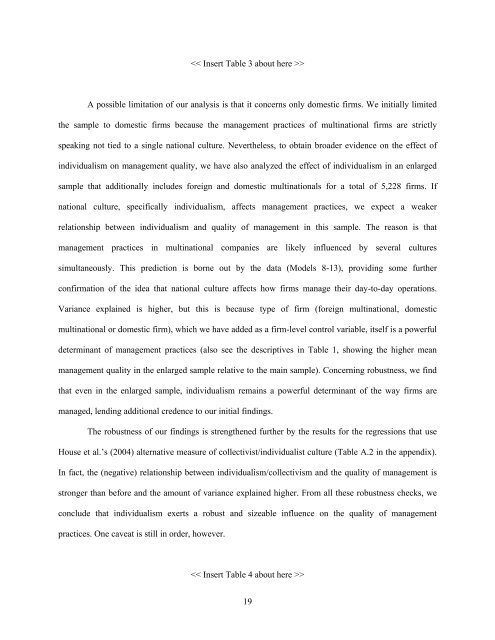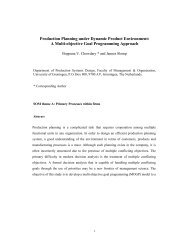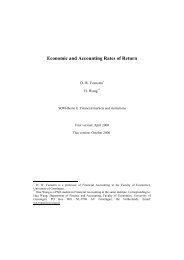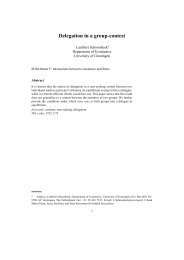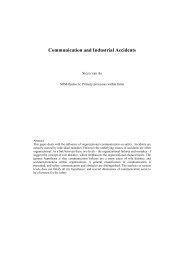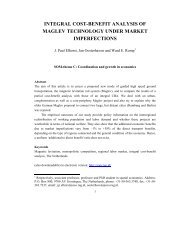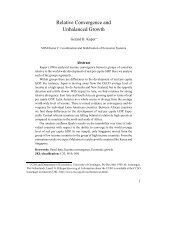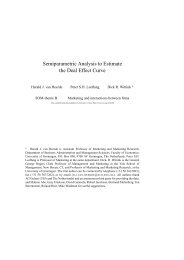Individualism and the cultural roots of management practices
Individualism and the cultural roots of management practices
Individualism and the cultural roots of management practices
Create successful ePaper yourself
Turn your PDF publications into a flip-book with our unique Google optimized e-Paper software.
A possible limitation <strong>of</strong> our analysis is that it concerns only domestic firms. We initially limited<br />
<strong>the</strong> sample to domestic firms because <strong>the</strong> <strong>management</strong> <strong>practices</strong> <strong>of</strong> multinational firms are strictly<br />
speaking not tied to a single national culture. Never<strong>the</strong>less, to obtain broader evidence on <strong>the</strong> effect <strong>of</strong><br />
individualism on <strong>management</strong> quality, we have also analyzed <strong>the</strong> effect <strong>of</strong> individualism in an enlarged<br />
sample that additionally includes foreign <strong>and</strong> domestic multinationals for a total <strong>of</strong> 5,228 firms. If<br />
national culture, specifically individualism, affects <strong>management</strong> <strong>practices</strong>, we expect a weaker<br />
relationship between individualism <strong>and</strong> quality <strong>of</strong> <strong>management</strong> in this sample. The reason is that<br />
<strong>management</strong> <strong>practices</strong> in multinational companies are likely influenced by several cultures<br />
simultaneously. This prediction is borne out by <strong>the</strong> data (Models 8-13), providing some fur<strong>the</strong>r<br />
confirmation <strong>of</strong> <strong>the</strong> idea that national culture affects how firms manage <strong>the</strong>ir day-to-day operations.<br />
Variance explained is higher, but this is because type <strong>of</strong> firm (foreign multinational, domestic<br />
multinational or domestic firm), which we have added as a firm-level control variable, itself is a powerful<br />
determinant <strong>of</strong> <strong>management</strong> <strong>practices</strong> (also see <strong>the</strong> descriptives in Table 1, showing <strong>the</strong> higher mean<br />
<strong>management</strong> quality in <strong>the</strong> enlarged sample relative to <strong>the</strong> main sample). Concerning robustness, we find<br />
that even in <strong>the</strong> enlarged sample, individualism remains a powerful determinant <strong>of</strong> <strong>the</strong> way firms are<br />
managed, lending additional credence to our initial findings.<br />
The robustness <strong>of</strong> our findings is streng<strong>the</strong>ned fur<strong>the</strong>r by <strong>the</strong> results for <strong>the</strong> regressions that use<br />
House et al.’s (2004) alternative measure <strong>of</strong> collectivist/individualist culture (Table A.2 in <strong>the</strong> appendix).<br />
In fact, <strong>the</strong> (negative) relationship between individualism/collectivism <strong>and</strong> <strong>the</strong> quality <strong>of</strong> <strong>management</strong> is<br />
stronger than before <strong>and</strong> <strong>the</strong> amount <strong>of</strong> variance explained higher. From all <strong>the</strong>se robustness checks, we<br />
conclude that individualism exerts a robust <strong>and</strong> sizeable influence on <strong>the</strong> quality <strong>of</strong> <strong>management</strong><br />
<strong>practices</strong>. One caveat is still in order, however.<br />
><br />
19


